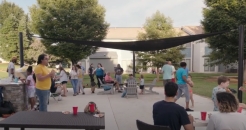 Property investment fostering community and mission
Property investment fostering community and mission
From a video by Faith&Co
What can a real estate investment fund do to care for people who feel alone despite living in a large multi-family apartment community and in the process generate financial and spiritual returns?
Based in Birmingham, Alabama, Welden Field is a real-estate development, investment fund management, and a property management firm. Its "business as mission" fund is committed to integrating care for tenants’ deep needs as it provides them with a place to call home. Welden Field has thoughtfully designed resident experience teams and relationship building outreach efforts. Doing life together with tenants provides practical help and encouragement and fosters community while planting and nurturing seeds of faith.
Chuck Welden, CEO of Welden Field and others take up the story:
I'm a lawyer and a real estate developer. How can I use the skill sets I have to advance the gospel?
We started seriously thinking through all the spheres of influence that our business has with all the stakeholders - shareholders, employees, customers, vendors, government officials, etc. How can our company use those spheres of influence to advance the gospel? We realized that we had to be serious about it because if somebody's not responsible for that spiritual impact then it just would be one of those things that it's number five on the list and never gotten round to.
So we created a position of Chief Spiritual Officer to think about the spiritual framework and help us come up with a plan at Weldon Field to make money for our investors and have an impact. If we're going to hope for spiritual impact you have to plan for it. If we're profitable but we have no spiritual impact we fail. If we have spiritual impact but no profit we also fail.
We chose multi-family property development because of the number of people that live on the site and our continued presence in running the services, along with vendors. [Multifamily real estate is any property with multiple units rented out for people to live in e.g. apartments, condos, etc.] We created an investment fund and bought five properties and we set out to try to bring people far from God into knowledge of Him.
In an apartment complex, they say you only know two or three families on the whole property and that's kind of lonely. What we will do is we'll run events that just bless the community. So if you're a new resident, you move in and, within the next week or two you would have somebody knock on your door. They'd have a welcome basket, introduce themselves and say, "We're here with Resident Experience and we exist to care for the needs of the community. We'll be doing community events. We'll be out walking around. If you ever see us, we'd love to have a conversation with you." All the resident experience team are resident volunteers. It's important to know that if someone knocks on your door and you don't want to be a part of resident experience you don't have to.
They're not trying to bash people over the head with a Bible. They're not trying to manipulate. They're there to care for people.
We can have a ministry co-ordinator at an apartment complex. An example is a local pastor who is part-time at church. He's meeting residents when prayer walking, getting to know one another and and sharing about the love of Christ. We can also have disciple making team members on site. Living on site has a lot to do with who you know, what you see and how you can communicate with people. So being in a location with a community is really helpful for seeing into someone's life.
Investors have agreed to 8-10 year investments. Then they'll own the property for another 8-10 years with the idea of selling it and making a return. The returns are about two percent less than typical apartment deals. This is because we charge the property about two percent of the equity per year to help accomplish our resident life experience and to help pay for the overhead of our staff.
One of the tensions that we live in is the idea that, when we buy apartment communities, we'll go in and renovate the units and have to raise rents to cover the costs. Although we can then create impact, some existing families can't afford the new rent. We therefore have to think through strategically how to minimize any rent increases, especially for low-income housing. So we want to talk to our investors about lower returns and to help be part of the solution of the affordability issue.
Watch the 12 min video:
Retweet about this article:
From a video by Faith&Co, 21/05/2025